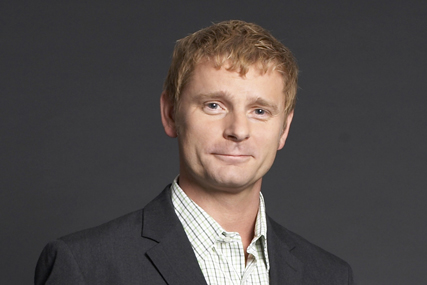I am the mayor of the Cumberland Pencil Museum in Keswick. From the picture to the right, you probably hadn't guessed I'd got it in me; but this honour was conferred by Foursquare, one of a batch of location-based services that are taking over a smartphone near you.
The idea behind Foursquare is that you 'check in' whenever you visit anywhere - such as a club, restaurant or obscure museum. Doing so enables you to earn badges - virtual rewards that reflect the sort of person you are - and visiting a place with sufficient frequency earns you the mayorship of it.
In part, the idea is that the service lets you know whether your friends have checked in at the same location, potentially prompting a spontaneous get-together. However, just as some of the numbers in my phone's contacts list are for people I use caller recognition to avoid, Foursquare might also enhance my twat-evasion skills if I spend a few minutes 'friending' some truly avoidable people.
That seems worthwhile. So much so, in fact, that Facebook replicated the functionality in its Places system. But is it enough, and are location-based services really the 'big thing' for the coming year?
From Google Latitude (show my location on Google Maps) to Grindr (show people nearby with the same, um, interests), location is attracting lots of attention from start-ups, and acquisitions from the usual suspects (although probably not Grindr).
Throwing open APIs for some of these services means new functionality on a daily basis. There are apps for Foursquare that allow dating, chat, food reviewing and photo sharing. You can check in using voice, have the phone do it automatically, and check in simultaneously to competitor services such as Gowalla and Brightkite.
All this telling people where you are is raising concern in some circles, however. Pleaserobme.com was launched by one group to highlight worries that in telling the world that we're at, say, PizzaExpress, we are also telling burglars that we're not at home.
Their fear is broader, too: that you're telling your boss you're at a job interview elsewhere, or your wife that you're at a massage parlour (professional footballers beware). There are likely to be scare stories before this sorts itself out, but location-based services are a major new competitive front for business - one that, as usual, can be ignored, but could represent an opportunity to steal share from the less fleet of foot.
Foursquare has signed a deal with Safeway in the US to link the retailer's loyalty card scheme to the service. Trialling in 300 Vons stores (a Safeway subsidiary), it will reward users with PepsiCo products based on their behaviour. Early risers get Tropicana, Gym-Rat badge-holders get mineral water.
By swiping their card, users check in automatically to Foursquare and collect points, neatly reversing the usually virtual nature of the system and effectively checking in people as they leave, rather than arrive.
It feels like the first scaleable commercial relationship Foursquare has struck - previous attempts have looked more like one-off promotions - and it wouldn't be hard to make the technology allow advertising elsewhere on the web to target these consumers, based on a cookie from their badge-win.
Giving businesses the ability to target consumers at scale as they walk by has huge social implications. We might not book a hotel, restaurant or taxi in advance, instead relying on our phone to find us deals nearby, sometimes recommended by friends. A lot more of our purchasing could be just-in-time, changing radically the consideration cycle across a wide range of brands.
This won't be for everyone, but it's likely to represent a growing percentage of transactions over the coming year for leisure brands. I won't be defending my mayorship with appreciable vigour; but I will be doing less planning in 2011.
Andrew Walmsley is a digital pluralist.
30 SECONDS ON ... Foursquare
- Foursquare is a location-based social-networking web and mobile app that allows registered users to connect with friends and update their whereabouts.
- If a Foursquare user 'checks in' at a venue on more days, than anyone else in the past 60 days, they will be crowned 'mayor' of that venue, until someone else earns the title.
- Users can have their 'check-ins' posted on their accounts on Twitter or Facebook.
- Foursquare was created by Dennis Crowley and Naveen Selvadura. Crowley founded a similar project, Dodgeball, which Google bought in 2005 and replaced with Google Latitude in 2009.
- Foursquare was launched on 11 March 2009 in New York. In October 2010, it signed up its four millionth user.
- On 22 October, astronaut Doug Wheelock unlocked the NASA Explorer badge by checking into Foursquare from the International Space Station.
- Foursquare has commercial partnerships with brands such as The New York Times, Zagat, Conde Nast and Bravo.


